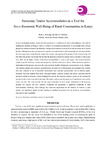Homestay Tourist Accommodation as a Tool for Socio-Economic Well-Being of Rural Communities in Kenya

View/
Date
2018Author
Kimaiga, Ruth K.
Kihima, Bonface O.
Nzioka, Alice
Metadata
Show full item recordAbstract
In most developing countries, tourism has been portrayed as a contributor to small scale enterprises, thus directly uplifting the standards of living as well as a catalyst for community development. As an extended form of local people involvement in tourism, the homestay concept aims to promote households to earn an income from tourism directly. Although homestays are purported to provide economic benefits to the local people, it is not clear whether the local people fully benefit from the venture. For instance, the majority of the people in Taita Taveta County still live below the poverty line despite the fact that the homestay concept has already been in existence in the county since 1989 and the highest number of homestay accommodation is found in this region. This research therefore sought to put the homestay concept into perspective: Identify motivational factors behind homestay operators’ participation in the program and assess the socio-economic benefits of homestay accommodation to host families. This research adopted cross-sectional research design and made use of both primary and secondary data. Primary data were collected by use of researcher administered semi-structured questionnaires and an interview guide. Secondary data were gathered from books, newspaper articles, academic journals, the Internet, and other relevant documents related to homestay. Census technique was used for the homestay operators. Hence, all the 54 homestay operators in the county were used in the study. Descriptive analysis and chi-square test of significance were used to analyse the data. The study revealed that the major motivation for local people participation in the homestay program was income and most operators considered the programme a significant contributor to their socio-economic well-being. These findings have important implications for the Ministry of Tourism to craft policies and legislations geared towards creating an enabling environment for the homestay accommodation sub-sector to grow sustainably
